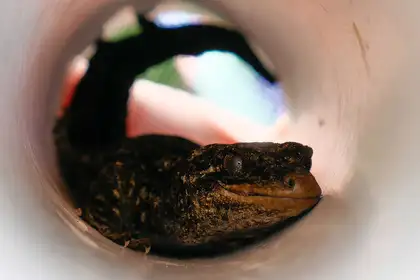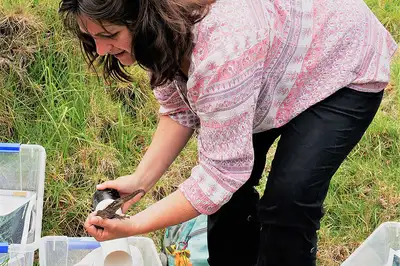
Ninety native geckos were released on Motutapu Island last week and a second release is planned for December on Otata Island, thanks to a collaboration with Massey University and the Department of Conservation (DOC) that will see a native species reintroduced to pest-free sanctuaries in the Hauraki Gulf.
Duvaucel's gecko were once widespread throughout Aotearoa but are now restricted to 36 offshore islands because of the impact of predators and humans. Reintroducing Duvaucel's geckos to these pest free island sites will create two new self-sustaining populations and extend their current range.
Massey researcher Dr Manuela Barry is putting theory into practice by implementing two relocations of captive-reared kawekaweau/Duvaucel's gecko back to the wild.
This reintroduction marks both the culmination of a 10-year breeding programme based at Massey’s Auckland campus as well as the beginning of a long-term collaborative monitoring programme run by Dr Manuela Barry, Ngāi Tai ki Tāmaki iwi, the Department of Conservation (DOC) and the Motutapu Restoration Trust.
Research Officer from the School of Natural and Computational Sciences Dr Manuela Barry says the reintroductions will help achieve the islands' ecosystem restoration goals by re-establishing a species that once lived there. “Motutapu is great habitat for the gecko to thrive thanks to the ongoing work between DOC and our Treaty partner Ngāi Tai ki Tāmaki to keep Motutapu pest-free.”
The project links-in with Dr Barry’s wider research programme on the reintroduction biology of Duvaucel’s geckos at various sites within the Hauraki Gulf Marine Park.
“This is a research-focussed monitoring programme, and we hope to gather long-term data on establishment success and the resilience of Duvaucel’s gecko populations in different ecological settings,” she says.

Dr Manuela Barry
DOC Senior Biodiversity Ranger David Wilson explained that it's the first time the kawekaweau/Duvaucel's gecko have been released on Motutapu, a pest-free sanctuary.
The geckos came from Korapuku Island off the Coromandel coast and will join other native and protected species on Motutapu including the takahē and tūturuata/shore plover.
Ngāi Tai ki Tāmaki leader Billy Brown notes, "The kawekaweau are a taonga species for our people. They are resilient and have been around a lot longer than tangata whenua in Aotearoa."
Dr Barry acknowledges the significance of this partnership and recognises the joint efforts that have gone into this collaborative project.
The two reintroductions are made possible by funding from the Motutapu Restoration Trust and the Auckland Zoo Conservation Fund (Otata Island).
Invaluable logistic and on-ground support is provided by Ngāi Tai ki Tāmaki, the Department of Conservation (Motutapu Island) and the Neureuter Family (Otata Island).